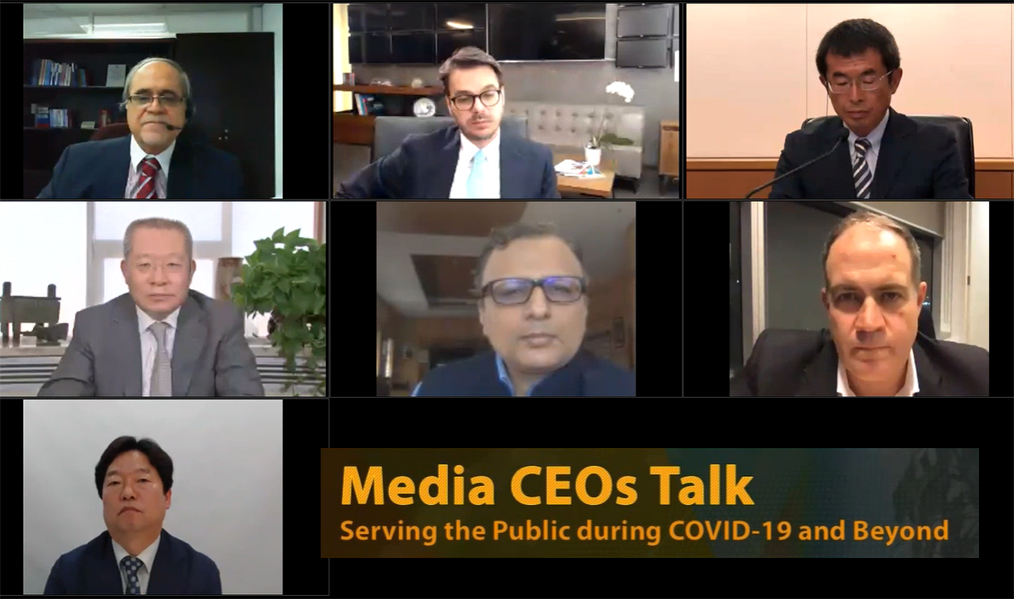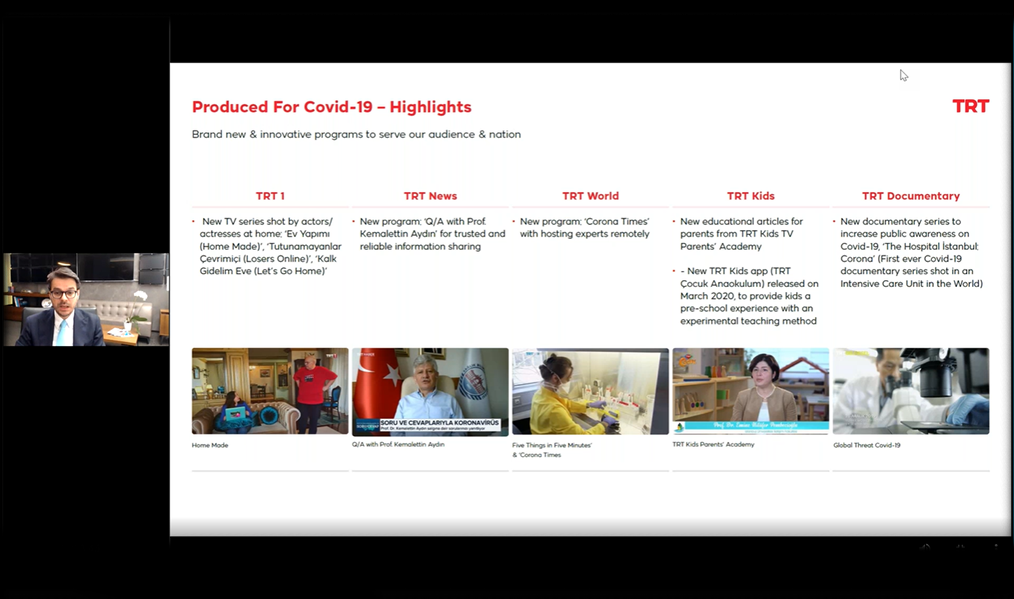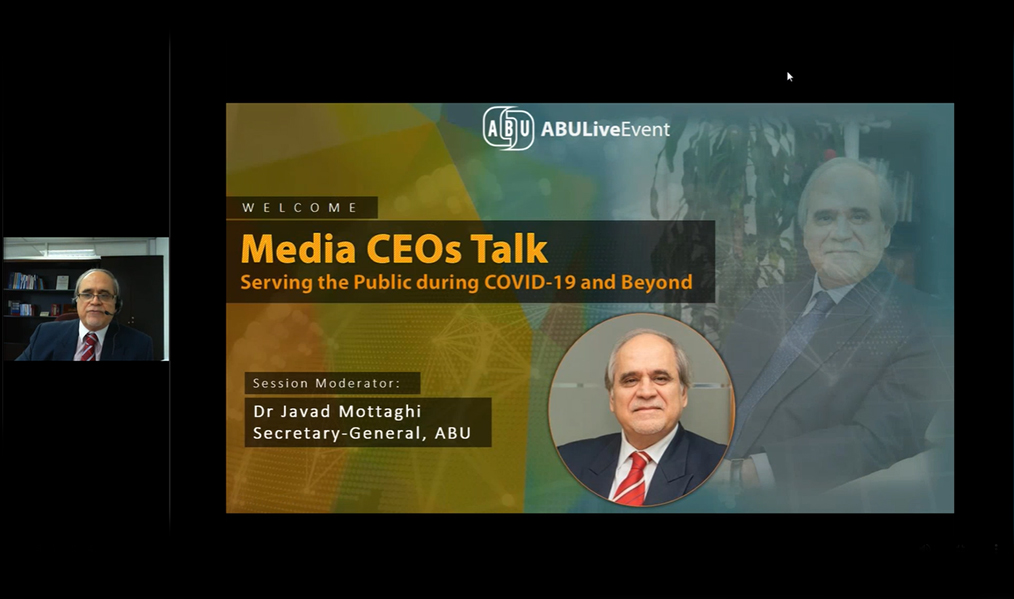
ABU Media CEOs Talk “Serving the Public during COVID-19 and Beyond”
The CEOs of six major broadcasters in Asia – Pacific shared their organisations’ experiences during the pandemic in an invigorating discussion online, joined by over 250 participants from across the world.
Mr Ibrahim Eren, ABU Acting President, Director General and Chairman, TRT, Turkey captured TRT immense efforts in response to the COVID 19 to protect staff, turn around programme schedules, invent new ways to produce programmes remotely, keep the public safe and updated with accurate news and boost morale of the people through engaging formats such as the multi-faceted programme “Home is Full of Life”. He noted that the crisis has provided public service broadcasters with an opportunity to show that they serve the public. Mr Eren also said that the lessons learned from the pandemic will shape the future policies of TRT and that the pandemic is the time and opportunity to be bold and experiment with new ideas how to serve the nation.

Mr David Anderson, Managing Director, ABC, Australia, focused on the record ABC audience ratings during the pandemic, which followed one of the most devastating bush fires in the history of the country. He praised the ABC staff for their dedication and hard work to deliver timely and accurate information across all platforms while working from home.
His message was that the public service broadcasters exist to serve the public with trusted information that the public need in order to make informed decisions. He added that it is crucial for broadcasters to get the facts and provide accurate information. No one would remember a broadcaster for being first but everyone will remember when a broadcaster has got the information wrong. Mr Anderson emphasised that during the crisis it has become apparent that the ABC is the most trusted media in the country. This is the biggest reward for any public service broadcaster.

In his overview, Mr Sun Yusheng ABU Vice President, Vice President CCTV & Executive VP CGTN, China, outlined his organisation’s efforts not only in keeping informed the most populous country in the world but providing vital information on the pandemic to the international community since foreign journalist couldn’t travel.
Mr Sun also elaborated on the live-stream broadcasting of the building of two hospitals in seven days. He pointed out that providing schooling through radio and TV had been one of the biggest contributions of China Media Group to the nation during these challenging times. Mr Sun emphasised that the future of public service media depends on the ability to build trust with audiences and that is also their greatest responsibility.
Mr Shashi Shekhar Vempati, CEO, Prasar Bharati, India paid tribute to COVID Warriors and briefed how his organisation leveraged on human capital and technology to deliver accurate news to millions, battling fake news and delivering lifesaving information in the multitude of languages and dialects of India. Mr Shashi Shekhar Vempati informed that DDI and AIR also had record ratings during the pandemic. This is a sign of people’s trust in the national public service broadcaster. He spoke about introducing innovative formats for citizen engagement and education through radio and TV for millions of children.
He emphasised that this time of unprecedented crisis calls for all broadcasters to unite and work together in the name of humanity not only as citizens of their nations but as citizen of the world.
Mr Masagaki Satoru, Executive Vice President, NHK, Japan, showed interesting examples of programmes specially created to serve the public during the crisis – from practical advice on protection to intellectual discussions with world thinkers. He stressed out that the main objective of NHK right from the beginning of the pandemic had been to provide tools to wide audiences to cope with the crisis. These range from innovative ways to provide accurate, timely information and education for all to delivering high – quality entertainment to easy public anxiety. Mr Masagaki Satoru shared NHK new approach to documentary production showcasing the ground – breaking “We’re in This Together: Living with the pandemic”, a collaboration of 20 people from around the world who share their daily lives. He said that the pandemic has highlighted the indispensable service that public service broadcasters provide.
Mr Lim Byung-Kul, Executive Vice President, KBS, Korea spoke of the innovative and comprehensive coverage of the virus spread in his country, including a digital platform service, public awareness , efforts and guidelines to keep the employees safe. In a matter of days KBS created the COVID 19 Integrated Newsroom providing emergency alerts, news and documentaries by using innovative channels of delivering news and information.
The KBS campaign on raising public awareness of the nature of the virus and protection measures, has been a big factor in curbing the COVID 19 spread in the country. KBS emergency broadcasts have been a lifeline for millions of Koreans and their channels had record ratings throughout the pandemic. To protect staff KBS has embarked in employing new, innovative technics and technologies such as mobile newsgathering.
The CEOs briefs were followed by a lively Q&A session led by the moderator – ABU Secretary – General Dr Javad Mottaghi. The participants wanted to know among other things what medium was more effective in reaching broader audiences; what has been the impact on the Covid-19 pandemic on the quality of content and what public service broadcasters should do to keep the record ratings they had during the pandemic in the so called “new normal” post-pandemic life.
In their final remarks, the six CEOs united behind the view that the pandemic has shown the value of public service broadcasters to their nations. They should come together in times of crises to counter disinformation and provide accurate, objective information. The future of public service media depends on ability to build trust with the audiences and that is their responsibility. The collaboration between ABU members must go beyond the COVID 19 crisis and follow new ideas together with the other broadcasting unions so there is a collective action not only to fight the current pandemic but any future challenges to come.

